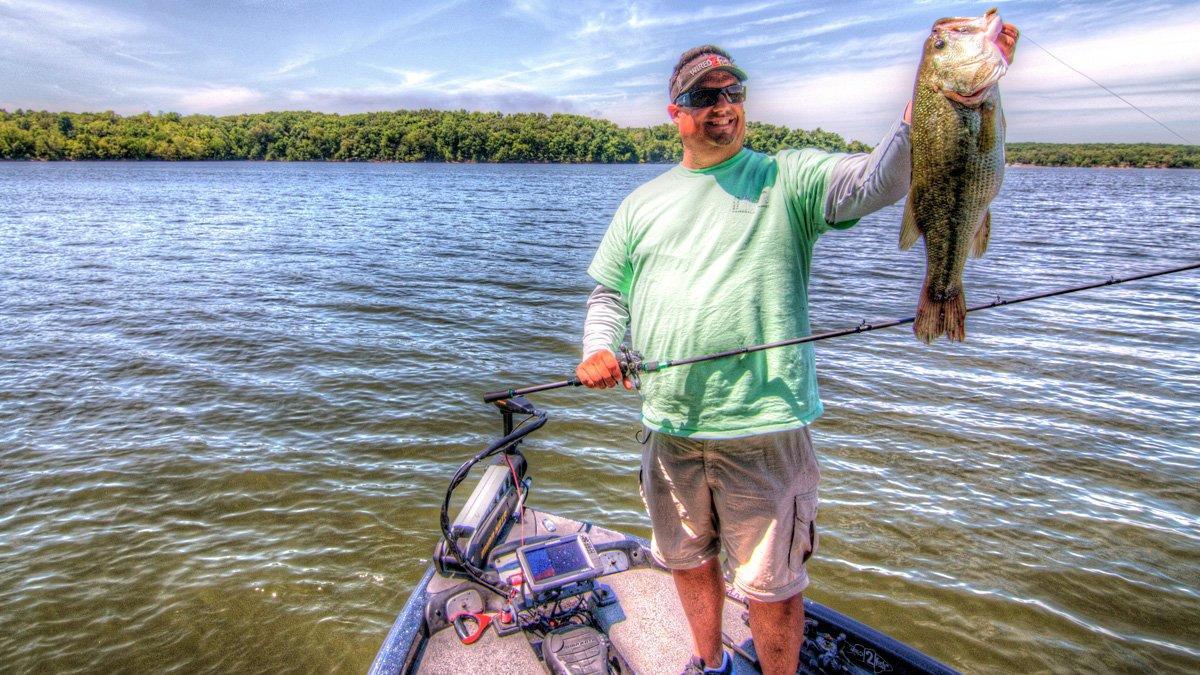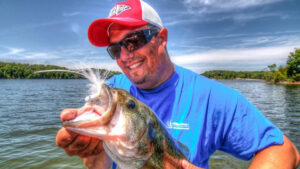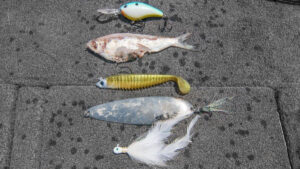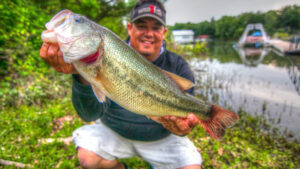If you’ve talked to many fishermen at the dock, watched a tournament weigh-in or eaves dropped on conversations at your local tackle shop, you’ve heard a lot of the same phrases get uttered.
“My timing was off. I was throwing big baits to catch big fish and never got around any. I couldn’t get them to fire up.”
Many anglers opt for overused excuses for lack luster fishing. But in truth, there are a few fishing colloquialisms that if you take them to heart, will lead you to more consistent fish catches and bigger bass. We all want to catch more and bigger bass. And, the attention to details outside of lures, line and tackle will lead you to a lot more catches.
Instead of using them as excuses, let’s consider the following 5 fishing colloquialisms that can actually help your fishing:
- Don’t just go through the motions
- Stay in tune with your bait
- Get your timing right
- Big lures catch big fish
- Ignite the school
DON’T JUST GO THROUGH THE MOTIONS
Going through the motions is a cliché in sports, but that’s because most athletes don’t even realize they are doing it. It’s easy for something to become second nature and require little to no thought to do it with minimal effort.
In fishing, just casting and winding will sometimes catch the fish, especially when they are active. But being completely engaged on every cast and every retrieve will lead to many more catches. Sometimes a speed change is all it takes to make a fish bite. That might be reeling as fast as possible. It might mean moving a bait and then pausing to let it flutter and fall.
But you have to pay attention to what you were doing when that first bass bites. Because you will often find that duplicating a cadence yields multiple fish instead of just the one.
I took my son fishing in a pond this winter. We fished 30 minutes without a bite. The water temps were below 40 degrees and that’s usually tough to get one bite let alone many. I scaled down to a grub and tried a slow retrieve. Then I started reeling slowly and then killing it about half way back when I thought I was in the deepest section of the pond. I caught 14 bass on 14 casts by paying attention to where my bait was on every cast and killing it right when I thought it was in a bass’s face.
Visualization can lead anglers to more consistent catches. As can knowing exactly what your bait is doing at all times.
STAY IN TUNE WITH YOUR LURE
My son asked me on the boat the last time we fished, “how do I tell a bite from the bait just grabbing and snagging on the bottom?” That’s the million dollar question for anglers just learning to fish, especially with lures where you’re dragging it slowly on the bottom. But even veteran anglers get complacent.
With crankbaits, you hear guys talk about feeling what the bait is doing at all times. When you get really good and in tune with your crankbait, you’ll actually feel the fish take the water off your bait before you feel the hit. The bait will lose a pulse or two and then you’ll feel the strike.
But knowing when your lure is coming over a tree, pulling through grass or bumping on a rougher patch of rock or shells on the bottom, can help you find those small subtleties that you would miss otherwise. Modern electronics show us a lot. But your lure can show you so much more if you will develop a feel with it.
It takes a lot of dragging, cranking and pulling along all types of bottoms to get a good feel for your lures. The more you have a feel for your lure, the easier it will be for you to tell when it’s not normal, in other words when a fish has changed what you’re feeling. But you have to be engaged and concentrating on your lure on every cast.
GET YOUR TIMING RIGHT
“My timing was off today.”
I hear that a lot on the lake I fish the most, Kentucky Lake. Many anglers I believe still think that a bass sits motionless in one place all day, and it’s just a matter of getting your bait in front of where he’s sitting.
The fact is bass move. A lot. They move for weather, they move for seasons and most of all, they move to eat. And the more they move with their buddies, i.e. schools of bass, the more your timing has to be right.
Much like us, bass are not eating 24 hours a day. The might move up 8-10 times a day to feed. Maybe more or maybe much less depending on the season. So being in a good spot is not always a guarantee of catching a fish.
Good spots vary from season, month, day and time of day. Bass will be on certain areas in one season and completely different areas in another season. Bass might be on a specific lake feature one day and not the next 4 days.
I think the misconception that bass sit on the same spots every month of every year or that bass will be on the same type of spots from one fishery to the other deters many anglers from the start.
Often it’s simply a matter of understanding the types of places bass want to be from season to season or knowing what spots are hot at which times of the year to put more fish on the line.
But even the right spot at the right time of the year, might have small windows each day where they are the most productive. I have creek channel ledges that are good early morning ledges and ledges that are late afternoon ledges. I don’t know why that is exactly. But I prove it to myself time and time again.
You will find the same the more you start visiting your good spots in the right season and multiple times a day.
BIG LURES CATCH BIG BASS
I’ve taken this to heart in the last few years. Often times if you want to catch a different class of bass, you have to show them the class of forage imitators they eat with regularity. I also think we underestimate the effect of pressure on bass.
If I know guys are fishing a lot of the same places I fish, the natural inclination used to be, pick up that drop shot or that shaky head and scratch out just a few more fish behind them on those pressured spots. But in recent years, I’ve learned that the bass often just need to see something radically different.
Where I live, bass eat very large forage like gizzard shad that weigh more than one of Shaquille O’Neal’s sneakers. That’s true all over the country. It might be big bluegill, it might be large shiners or even other game fish like trout or white bass. But a few things I know about bass have always held true: they are opportunistic and they like to see if certain things will fit in their mouth.
We’ve seen swimbaits get larger and larger. Spoons as well. How about 10XDs and other magnum crankbaits? Everything keeps getting bigger, and the bass continue to respond in kind by chomping on these magnum size lures.
I shot a video last week on Kentucky Lake. I caught a nice bass on a swimbait. But when I got her in the boat, she had a huge tail in her throat. I pulled it out and it was a gizzard shad bigger than any lure I had in my boat. So she just ate that, and thought she still had enough room for my big swimbait.
IGNITE THE SCHOOL
You hear the phrase, “I just couldn’t get them fired up” a lot. Especially among the tournament crowd. Most guys think you have to do something aggressive to make the bass go crazy and start feeding. But that’s not always the case. In fact I’ve found that if you can just get a few bass to bite, then you can pick up a wide variety of lures and start getting bites from multiple fish when they are schooled up together in the summer, fall and even in the prespawn.
I don’t think that bass necessarily all have the same urge at the same time. Rather, I think they are curious and competitive. We often talk about our lures looking like wounded prey. But I think much of the time a bass is reacting to a lure for no other reason than it looks like another bass is chasing it away. He will go see why it’s getting chased, and then being competitive, he will try to get it himself.
I’ve fired up schools with a drop shot. I’ve done it on my home lake as well as Lake Erie and natural lakes in Minnesota and New York. The fact is you just have to get bass feeding, looking and biting and his buddies will get really competitive when that happens.
I’m sure there are a lot more colloquialisms you’ve heard used as excuses. But we should all be striving to improve as anglers for no other reason than we want to enjoy our limited time on the water more. The more you concentrate on what your lure is doing and how the fish are reacting to what you’re doing, the more proficient you will become and the better class of fish you will catch.














